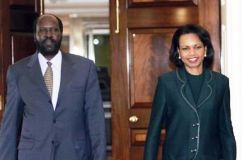Sudan’s Kiir says he can’t guarantee self-determination result
Nov 3, 2005 (WASHINGTON) — Sudan’s First Vice-President Salva Kiir, said Thursday he cannot guarantee he will vote for national unity when the time to vote comes up, Kiir is in Washington for meetings with US officials to discuss peace efforts in Sudan,
 Kiir, speaking to a handful of Arab journalists, said he is still undecided about whether he will vote for or against national unity, but will cast his vote based on what the situation on the ground is at the time and how well southern interests are represented in the new Sudanese constitution.
Kiir, speaking to a handful of Arab journalists, said he is still undecided about whether he will vote for or against national unity, but will cast his vote based on what the situation on the ground is at the time and how well southern interests are represented in the new Sudanese constitution.
The First Vice-President, also president of southern Sudan government, took over the post after the death of SPLM leader and former First Vice-President John Garang in a plane crash July 30, just a few weeks after assuming the position.
In his first visit to the United States as Vice-President, Kiir said he is not fighting for the separation of southern Sudan, but for the rights of people in the south.
According to Kiir, current laws in Sudan make it so that any oil wealth from the south is split evenly between the two sides, but any oil in northern Sudan is the sole property of that area with the south having no rights to any of the profits.
But regardless of roadblocks leading to a long-lasting peace in Sudan, Kiir told KUNA that the overall goal is to work for national unity and make it “attractive” for southern Sudanese.
He also rejected criticism that the Comprehensive Peace Agreement (CPA) signed in January to end over two decades of civil war between the north and south has been moving slowly, but admitted there was some concern from US officials that implementation of the CPA was not moving fast enough.
During his visit to Washington, Kiir met with Vice President Dick Cheney, US Secretary of State Condoleezza Rice, Deputy Secretary Robert Zoellick and members of the US Congress.
“What we talked about was the situation in Darfur and the implementation of the CPA,” said Kiir.
Kiir said he discussed with US officials the formation of the National Petroleum Council and the Boundary Commission.
Increasing US aid to Sudan was not discussed with officials said Kiir, adding that neither was the issue of lifting US sanctions on Sudan, imposed since 1997, or removing the country from the US “terrorism list” discussed this time.
Economic sanctions were set to expire this week, but US President George Bush extended them and explained in a memorandum to Congress that the crisis between the United States and Sudan “has not been resolved” and Sudanese policies continue to pose “an extraordinary threat to the national security and foreign policy of the United States.
“Despite the US position, Kiir said representatives of northern and southern Sudan will continue to urge Washington to lift sanctions because they are affecting ordinary citizens.”
Deputy Zoellick announced after his meeting with Kiir this week that he will be traveling to Sudan in the next few days to meet with leaders in Khartoum to emphasize that their words for peace must be backed up by actions.
The US official will also meet with rebel leaders in Darfur to help end infighting and ensure they have a unified agenda to agree on for peace.
(KUNA/ST)
